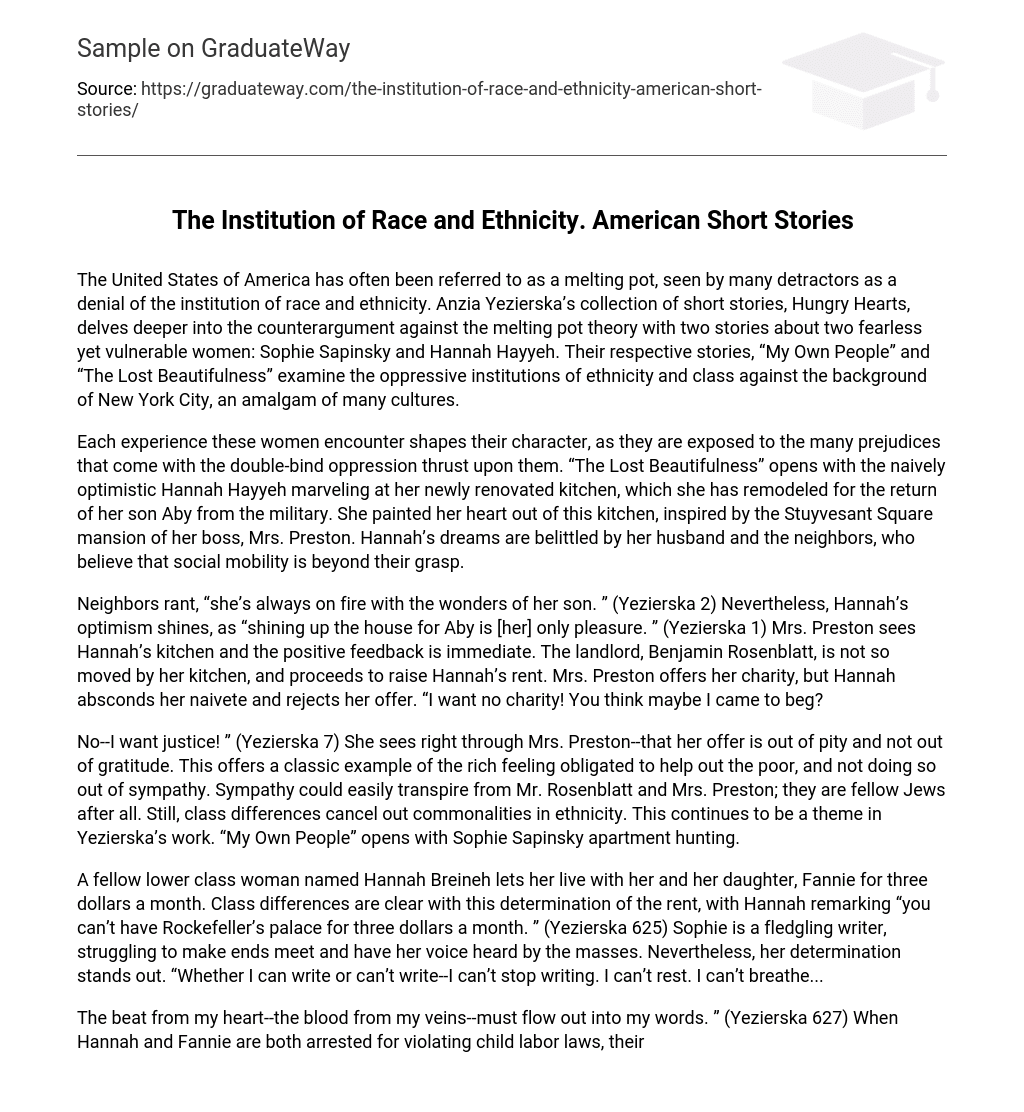The United States of America has often been referred to as a melting pot, seen by many detractors as a denial of the institution of race and ethnicity. Anzia Yezierska’s collection of short stories, Hungry Hearts, delves deeper into the counterargument against the melting pot theory with two stories about two fearless yet vulnerable women: Sophie Sapinsky and Hannah Hayyeh. Their respective stories, “My Own People” and “The Lost Beautifulness” examine the oppressive institutions of ethnicity and class against the background of New York City, an amalgam of many cultures.
Each experience these women encounter shapes their character, as they are exposed to the many prejudices that come with the double-bind oppression thrust upon them. “The Lost Beautifulness” opens with the naively optimistic Hannah Hayyeh marveling at her newly renovated kitchen, which she has remodeled for the return of her son Aby from the military. She painted her heart out of this kitchen, inspired by the Stuyvesant Square mansion of her boss, Mrs. Preston. Hannah’s dreams are belittled by her husband and the neighbors, who believe that social mobility is beyond their grasp.
Neighbors rant, “she’s always on fire with the wonders of her son. ” (Yezierska 2) Nevertheless, Hannah’s optimism shines, as “shining up the house for Aby is [her] only pleasure. ” (Yezierska 1) Mrs. Preston sees Hannah’s kitchen and the positive feedback is immediate. The landlord, Benjamin Rosenblatt, is not so moved by her kitchen, and proceeds to raise Hannah’s rent. Mrs. Preston offers her charity, but Hannah absconds her naivete and rejects her offer. “I want no charity! You think maybe I came to beg?
No–I want justice! ” (Yezierska 7) She sees right through Mrs. Preston–that her offer is out of pity and not out of gratitude. This offers a classic example of the rich feeling obligated to help out the poor, and not doing so out of sympathy. Sympathy could easily transpire from Mr. Rosenblatt and Mrs. Preston; they are fellow Jews after all. Still, class differences cancel out commonalities in ethnicity. This continues to be a theme in Yezierska’s work. “My Own People” opens with Sophie Sapinsky apartment hunting.
A fellow lower class woman named Hannah Breineh lets her live with her and her daughter, Fannie for three dollars a month. Class differences are clear with this determination of the rent, with Hannah remarking “you can’t have Rockefeller’s palace for three dollars a month. ” (Yezierska 625) Sophie is a fledgling writer, struggling to make ends meet and have her voice heard by the masses. Nevertheless, her determination stands out. “Whether I can write or can’t write–I can’t stop writing. I can’t rest. I can’t breathe…
The beat from my heart–the blood from my veins–must flow out into my words. ” (Yezierska 627) When Hannah and Fannie are both arrested for violating child labor laws, their journey for justice lights a fire in Sophie. The realism of class disparity sticks out. “Hannah Breineh is real. Hannah Breineh is life. ” (Yezierska 631) A so-called “friendly visitor” from the Social Betterment Society and a rich lawyer in a seal-skin coat named Mr. Bernstein exhibit the grandiosity of rich Jews. Once a poor person strikes it rich, they lose sight of their roots and absorb the wealth.
Mr. Bernstein is a classic example of this. As Mr. Bernstein tries to summarize Hannah’s case and the “friendly visitor” offers charity, Sophie turns livid. She screams out, “You are the greed–the shame of the Jews! ” (Yezierska 633) Sophie has finally found her voice and it is implied that her next piece of work will be inspired by the struggles of Hannah Breineh. Hungry Hearts was written at the height of the influx of Jewish immigrants to the United States in the beginning of the 20th century.
They faced several kinds of oppression, but Anzia Yezierska chooses to focus on classism and ethnic oppression in “My Own People” and “The Lost Beautifulness. ” Additionally, gender plays a part too, as the two respective protagonists are women. Sophie Sapinsky and Hannah Hayyeh fight for their voices to be heard in a world where they are virtually silenced and forced to oblige to their superiors. Eventually, they break from their subservience to voice opposition to the oppression they face, and implications arise that a brigade against the oppression will commence.





